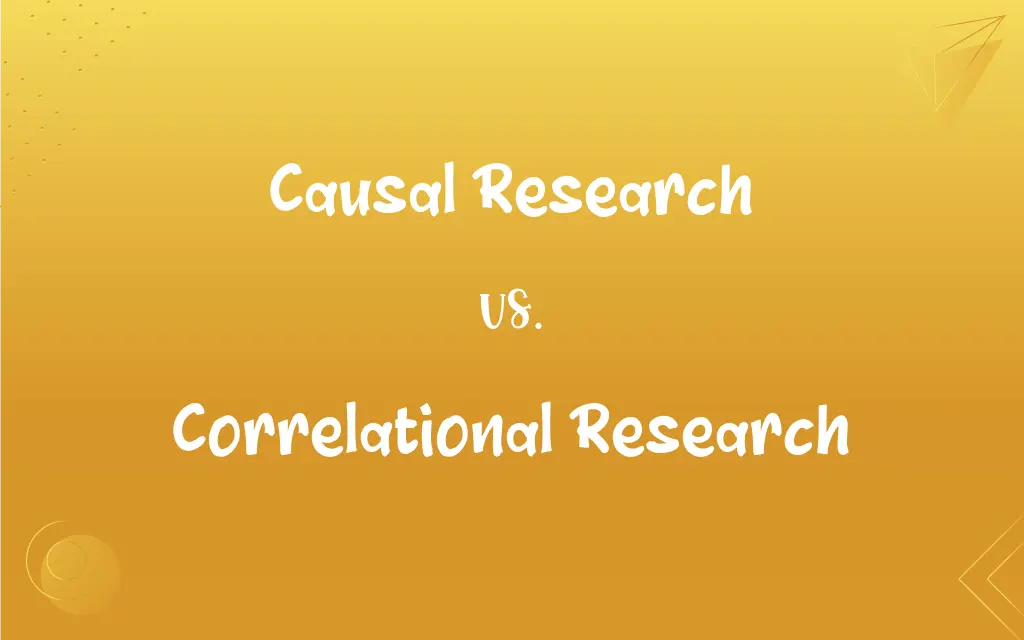Causal Research vs. Correlational Research: What's the Difference?
By Janet White || Published on November 19, 2024
Causal research aims to determine cause-effect relationships, whereas correlational research identifies relationships between variables without inferring causality.

Key Differences
Causal research is designed to test hypotheses about cause-and-effect relationships by manipulating one variable to see its effect on another. In contrast, correlational research examines the relationship between two or more variables to identify patterns and strengths of associations without manipulating any variables. This fundamental difference outlines their respective purposes and methodologies.
In causal research, experiments are often conducted in controlled environments to isolate variables and determine causation. Correlational research, however, typically involves observation and statistical analysis of existing data sets to identify trends or relationships, operating in more natural settings without intervention.
The outcome of causal research is a determination of how one variable affects another, making it invaluable for testing theoretical models and making predictions. Correlational research outcomes, while not establishing causality, provide insights into potential connections that may warrant further investigation or be used for prediction in some contexts.
Causal research is often more complex and resource-intensive due to the need for experimental control and manipulation of variables. Correlational research can be less costly and simpler to conduct, as it leverages existing data or observations without the need for intervention.
The choice between causal and correlational research depends on the research question. Causal research is suitable for questions about the effect of one variable on another, while correlational research is appropriate for exploring how variables are related.
ADVERTISEMENT
Comparison Chart
Purpose
Determines cause and effect relationships
Identifies relationships between variables without inferring causality
Methodology
Manipulates one variable to observe its effect on another
Observes and analyzes existing relationships between variables
Environment
Controlled settings for experiments
Natural settings without manipulation of variables
Outcome
Establishes causation between variables
Identifies patterns and associations, without establishing causality
Complexity and Cost
Often more complex and costly due to experimental control
Generally simpler and less costly, utilizing existing data
ADVERTISEMENT
Causal Research and Correlational Research Definitions
Causal Research
It involves controlled experiments.
In a lab setting, scientists altered light levels to observe plant growth.
Correlational Research
Correlational research examines the relationship between variables.
The study explored the correlation between diet and heart health.
Causal Research
Causal research determines if a change in one variable causes a change in another.
Researchers manipulated the amount of study time to see its effect on test scores.
Correlational Research
Utilizes statistical analysis to measure the strength of relationships.
The correlation between education level and income was analyzed.
Causal Research
Causal research tests hypotheses about cause and effect.
The study tested if increased exercise leads to weight loss.
Correlational Research
Can be conducted with observational data.
A survey was used to observe correlations between internet use and social skills.
Causal Research
Often requires random assignment to groups.
Participants were randomly assigned to either the control or experimental group.
Correlational Research
Suitable for preliminary research.
Initial research identified a correlation between air pollution and respiratory issues.
Causal Research
It can predict outcomes based on variable manipulation.
By adjusting marketing strategies, researchers predicted sales increases.
Correlational Research
It identifies patterns without implying causality.
Researchers found a correlation between hours of sleep and mood.
FAQs
Why is causal research considered more complex than correlational research?
Due to its need for controlled environments and variable manipulation, making it more resource-intensive.
Can correlational research establish causality?
No, correlational research can suggest associations but cannot prove causality.
What is correlational research?
Correlational research identifies patterns or relationships between two or more variables without attempting to determine causality.
How do causal and correlational research differ in methodology?
Causal research manipulates variables in controlled settings, while correlational research observes existing relationships without manipulation.
Is correlational research useful?
Yes, it provides valuable insights into potential relationships that may guide further research or inform predictions.
What is a controlled setting in the context of causal research?
A controlled setting is an environment where researchers can manipulate variables while minimizing external influences that could affect the outcome.
What is causal research?
Causal research aims to determine whether a change in one variable causes a change in another through controlled experiments.
What is an example of correlational research?
A study examining the relationship between social media use and self-esteem.
How can findings from correlational research be used?
They can inform hypotheses for future causal research, guide policy decisions, or suggest trends and associations in various fields.
How does sample size affect the outcomes of causal and correlational research?
Larger sample sizes can increase the reliability of results by reducing the impact of outliers and providing a more accurate representation of the population.
Can causal research predict outcomes?
Yes, by understanding cause-and-effect relationships, it can predict the impact of changes in variables.
What is an example of causal research?
An experiment testing how a new teaching method affects student learning outcomes.
Can the results of causal research change over time?
Yes, as variables and societal contexts evolve, the relationships identified through causal research may shift, necessitating ongoing investigation.
How do researchers choose between causal and correlational research?
The choice depends on the research question, with causal research used to understand cause and effect, and correlational research for exploring relationships.
What role does statistical analysis play in correlational research?
It measures the strength and direction of relationships between variables, helping to quantify associations.
Can causal research be conducted outside of laboratory settings?
Yes, though it's more challenging, causal research can be conducted in field experiments where variables are manipulated in natural environments.
Why is random assignment important in causal research?
Random assignment helps ensure that any differences observed between groups are due to the manipulated variable, not preexisting differences.
Are there ethical considerations in causal research?
Yes, especially in experiments involving humans or animals, ethical considerations include informed consent, avoiding harm, and ensuring participants' rights are respected.
How do researchers interpret a correlation coefficient in correlational research?
The correlation coefficient indicates the strength and direction of a relationship between two variables, with values closer to -1 or +1 signifying stronger associations.
What are the limitations of correlational research?
It cannot prove causation, and findings may be influenced by third variables or confounding factors not accounted for in the analysis.
About Author
Written by
Janet WhiteJanet White has been an esteemed writer and blogger for Difference Wiki. Holding a Master's degree in Science and Medical Journalism from the prestigious Boston University, she has consistently demonstrated her expertise and passion for her field. When she's not immersed in her work, Janet relishes her time exercising, delving into a good book, and cherishing moments with friends and family.







































































